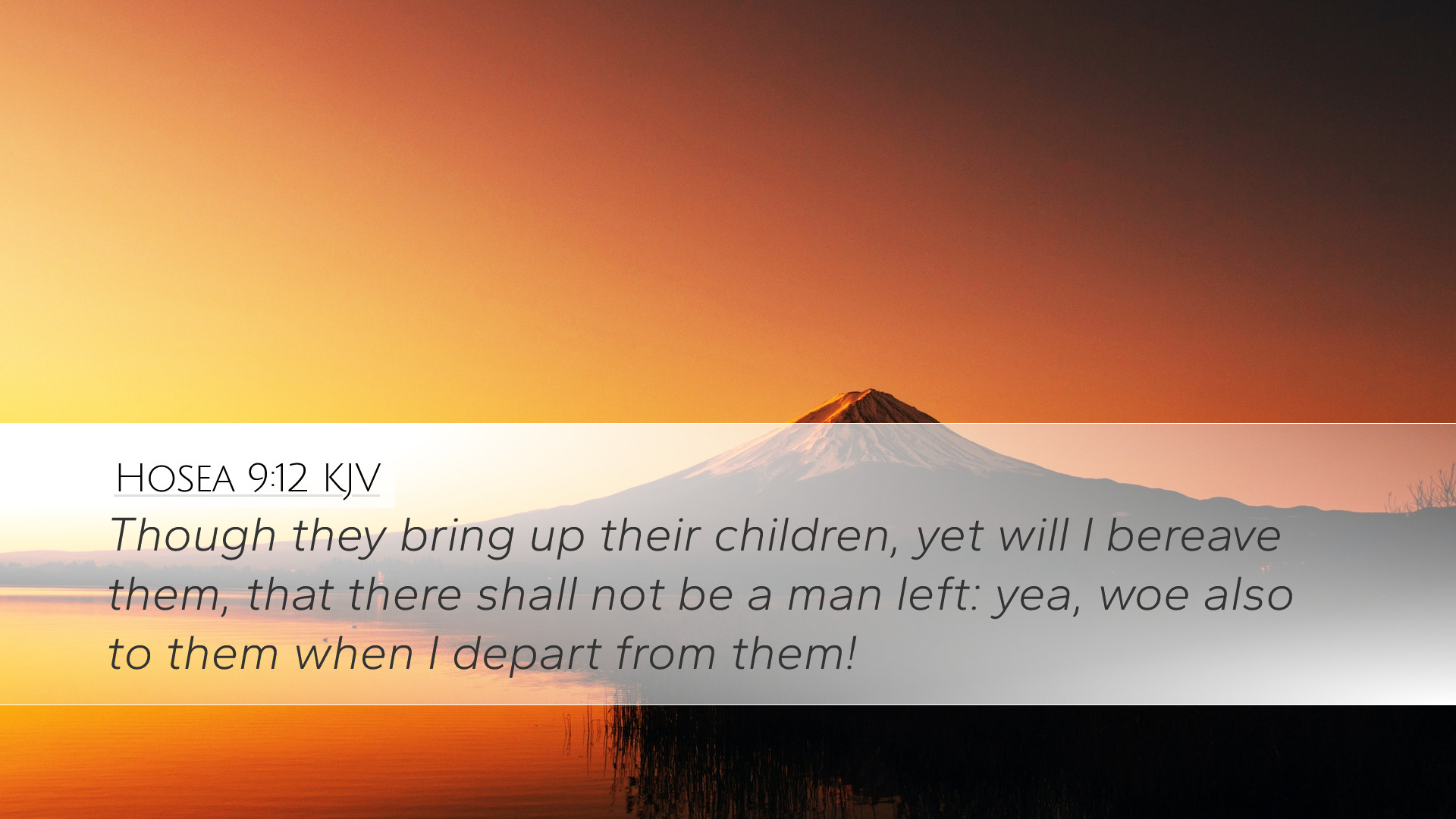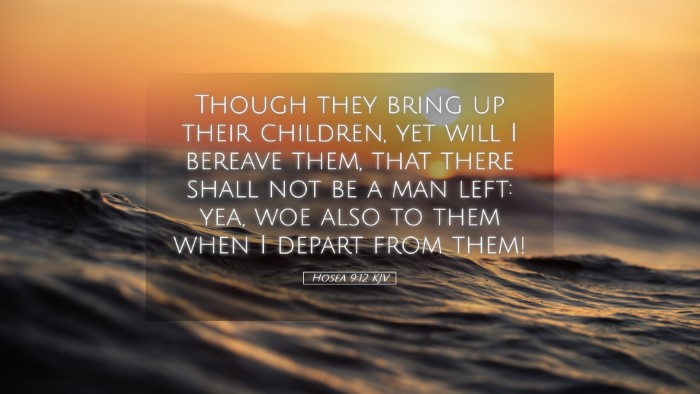Old Testament
Genesis Exodus Leviticus Numbers Deuteronomy Joshua Judges Ruth 1 Samuel 2 Samuel 1 Kings 2 Kings 1 Chronicles 2 Chronicles Ezra Nehemiah Esther Job Psalms Proverbs Ecclesiastes Song of Solomon Isaiah Jeremiah Lamentations Ezekiel Daniel Hosea Joel Amos Obadiah Jonah Micah Nahum Habakkuk Zephaniah Haggai Zechariah MalachiHosea 9:12
Hosea 9:12 KJV
Though they bring up their children, yet will I bereave them, that there shall not be a man left: yea, woe also to them when I depart from them!
Hosea 9:12 Bible Commentary
Commentary on Hosea 9:12
The verse Hosea 9:12 states, "Though they bring up their children, yet will I bereave them, that there shall not be a man left: yea, woe also to them when I depart from them." This poignant proclamation by the prophet Hosea captures profound themes of judgment, human frailty, and divine sovereignty in the face of sin.
Contextual Analysis
The Book of Hosea addresses the spiritual infidelity of Israel, portraying God's relationship with His people through the metaphor of marriage. The nation had turned to idolatry, and the ensuing consequences are vividly illustrated throughout the text.
Setting and Historical Background
Hosea prophesied during a tumultuous period leading to the Assyrian conquest of the northern kingdom of Israel. This context is critical for understanding the urgency and weight of his message. The loss of the children mentioned in this verse symbolizes not just physical bereavement but also spiritual death, as the nation turns away from the living God.
Verse Breakdown
“Though they bring up their children”
Matthew Henry emphasizes the natural human desire to raise and nurture children. The act of bringing up children signifies hope and continuity; however, the divine pronouncement subverts this notion. Even the most diligent efforts of parents may ultimately be wasted if God's favor is withdrawn.
“Yet will I bereave them, that there shall not be a man left”
This statement conveys the certainty of God's judgment. Albert Barnes points out that the bereavement here is not merely physical but represents a deeper, spiritual desolation. The phrase "there shall not be a man left" underscores the complete and utter devastation that will beset Israel due to their idolatry.
“Yea, woe also to them when I depart from them”
Adam Clarke highlights the severity of God's separation from His people, suggesting that the real tragedy lies in the absence of divine presence. The sorrow ('woe') that accompanies this separation serves as a stark reminder that God’s absence leads to moral decay and societal collapse, irrespective of human effort.
Theological Implications
This verse invites us to reflect upon several key theological insights:
- Divine Sovereignty: The assertion that God will bereave demonstrates His absolute authority over creation. Even when humanity engages in the nurturing of future generations, divine will prevails.
- Human Responsibility: The verse underscores the importance of spiritual fidelity. Despite the innate desire to nurture and protect, failure to adhere to God’s covenant results in spiritual and communal ruin.
- Consequences of Sin: The lament of bereavement speaks to the dire consequences that arise from abandoning God. It highlights the somber reality that sin carries inevitable repercussions, not just for the individual but for the community at large.
- Hope in Despair: Even in this declaration of woe, there is an implicit invitation to repentance. God’s warnings are aimed at reclamation and redemption, showcasing His desire for reconciliation with His people.
Pastoral and Practical Applications
For pastors and theologians, Hosea 9:12 offers rich ground for practical application:
- Fostering Spiritual Resilience: Leaders are prompted to cultivate a community rooted in spiritual fidelity, ensuring that members recognize the importance of maintaining their commitment to God amidst cultural distractions.
- Child-Rearing with Purpose: Parents should be encouraged to rear children within the context of faith, understanding that spiritual guidance plays a critical role in their overall well-being and future.
- Addressing Sin with Love: As this verse illustrates the consequences of sin, it also serves as a reminder for leaders to address sin within the congregation compassionately yet firmly, advocating for genuine repentance and reconciliation.
- Highlighting God’s Presence: In sermons and teachings, emphasizing the necessity of God’s presence in everyday life can lead to a deeper understanding of its significance for individual and communal health.
Conclusion
Hosea 9:12 serves as a profound reminder of both the depth of human sinfulness and the constancy of God’s judgment. In exploring the multilayered meanings of this verse through the lenses of public domain commentaries, pastors, theologians, and scholars are afforded a greater understanding of the consequences of spiritual negligence and the importance of returning to God. The text urges readers to embrace the call for faithfulness while acknowledging the potential tragedy in departing from divine instruction.


